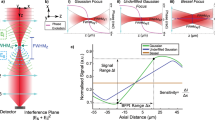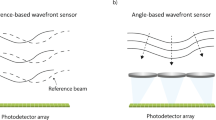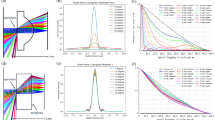Abstract
IN accurate measurements of focal-lengths and the like, on an optical bench, it is customary to employ the points of pins mounted on adjustable stands. The lens under test has itself to be so mounted as to enable it and the pin-points to be ‘lined up’ parallel to the tracks of the optical bench. This is a somewhat troublesome and time-consuming operation, and distracts the students' attention from the basic aim of the experiment. The device herein described eliminates much of this tedious procedure and can indeed yield more accurate settings than the older procedure. As it is easily adaptable to any type of optical bench, I will confine myself to describing the details peculiar to the device itself.
This is a preview of subscription content, access via your institution
Access options
Subscribe to this journal
Receive 51 print issues and online access
$199.00 per year
only $3.90 per issue
Buy this article
- Purchase on Springer Link
- Instant access to full article PDF
Prices may be subject to local taxes which are calculated during checkout
Similar content being viewed by others
Author information
Authors and Affiliations
Rights and permissions
About this article
Cite this article
DOWLING, J. Sensitive Parallax Detector for Optical Bench. Nature 174, 465–466 (1954). https://doi.org/10.1038/174465b0
Issue Date:
DOI: https://doi.org/10.1038/174465b0
Comments
By submitting a comment you agree to abide by our Terms and Community Guidelines. If you find something abusive or that does not comply with our terms or guidelines please flag it as inappropriate.



